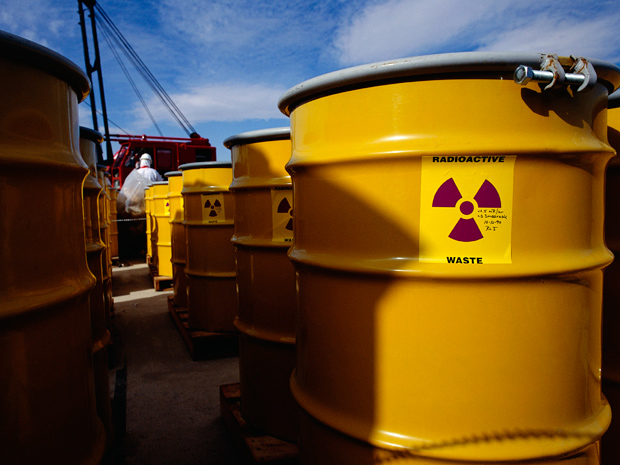
Court decision puts Norway on the hook for massive CO₂ Storage build-out
A ruling by the European Free Trade Association Court that Norway’s continental shelf falls under the European Economic Area Agreement could dramatic...
News

Publish date: November 13, 2019
News
Rosatom, Russia’s state nuclear corporation, has publically responded to criticism from Bellona over the company’s renewed policy of importing uranium hexafluoride, a byproduct of nuclear fuel fabrication, from an enrichment facility located in Germany.
In remarks published Monday by the RIA Novosti Russian newswire, the company insisted that the substance, which many environmentalists consider to be dangerous waste, is a valuable raw material that can be safely imported and recycled for further use, in accordance with Russian law.
Bellona published its concerns in Russian and English last week, after Greenpeace and Ecodefense revealed that Rosatom had resumed importing the material – a practice the corporation had ceased in 2009 after widespread protests from environmentalists in Russia in Germany.
Documents published in late October by Greenpeace and Ecodefense showed that Rosatom had signed a contract with Urenco, a German-based nuclear fuel consortium, to import 12,000 tons of uranium hexafluoride by 2022 – and that the first shipments had begun arriving in Novouralsk, near Yekaterinburg, as long ago as May.
In its Monday remarks, Rosatom invited Bellona to a special session of its public council – a consultative body comprised of environmental organizations – to discuss the imports. That meeting occurred Tuesday and was attended by Bellona’s Alexander Nikitin and other ecologists.
Uranium hexafluoride – also called depleted uranium – is a colorless radioactive powder that is produced as a byproduct of enriching uranium for use as fuel in nuclear power plants. If not used for uranium enrichment purposes, uranium hexafluoride can be disposed of as low-level radioactive waste if it is converted to chemically stable uranium oxide compounds.
The issue of uranium hexafluoride imports has galvanized environmental protest in Germany and Russia for decades. Critics of the practice have called attention to the dangers of transporting the chemical compound, as uranium hexafluoride can turn into gas when heated. Should an accident bring the substance into contact with water, it could produce highly toxic hydrofluoric acid.
But the main argument made by environmentalists against the import of uranium hexafluoride is that only a small quantity of uranium is returned to Germany after reprocessing. The rest remains in Russia – effectively as radioactive waste.
In its Monday response, and at the subsequent special session of its public council, Rosatom sought to assure Bellona and other environmental groups that this was not the case.
“The enrichment of depleted uranium is a widespread practice in the world,” the company said, adding that the product resulting from uranium hexafluoride reprocessing at Siberian facilities is then exported back to Germany.
The corporation also said that over the last ten years – since previous imports of uranium hexafluoride were halted – technologies to make what’s left over after reprocessing the compound safe have vastly improved.
Between 1996 and 2009, Tenex, the nuclear fuel subsidiary of Rosatom, imported some 100,000 tons of uranium hexafluoride from Urenco. In total, some 820,000 tons of the substances is stockpiled in Russia.
This surplus of the compound has fueled environmental arguments against importing yet more uranium hexafluoride from foreign sources. But at the meeting with Bellona, Rosatom officials described a program that would begin in 2024, which would eliminate Russia’s excess reserves of the compound by 2080.
The market in uranium hexafluoride has likewise experienced an uptick, Rosatom officials said. When the import of the compound was halted in 2009, prices were too low to justify the expense of reprocessing it.
At Tuesday’s public council meeting, Rosatom head Alexei Likhachev established a working group for environmental organizations that wish to monitor the company’s further work with the uranium hexafluoride imports.
In a statement following Tuesday’s meeting, Bellona welcomed the beginning of a dialogue with Rosatom on the issue, but cautioned that it “still has many questions, the answers to which we hope to receive in the course of conversations with specialists working at the facilities that reprocess uranium hexafluoride.”
The group also said that Rosatom should have notified the public of the imports prior to their arrival, rather than beginning them in apparent secrecy.

A ruling by the European Free Trade Association Court that Norway’s continental shelf falls under the European Economic Area Agreement could dramatic...

Bellona held a seminar on countering Russian disinformation in the Arctic at the Arctic Frontiers international conference in Norway

Our December Nuclear Digest, reported by Bellona’s Environmental Transparency Center, is out now. Here’s a quick taste of three nuclear issues arisin...

Bellona has launched the Oslofjord Kelp Park, a pilot kelp cultivation facility outside Slemmestad, about 30 kilometers southwest of Oslo, aimed at r...